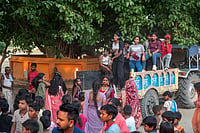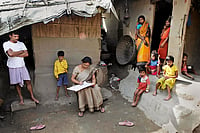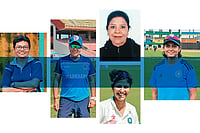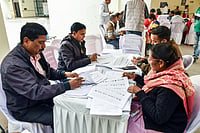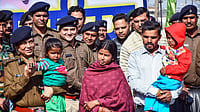Jitan Ram Manjhi was born on October 6, 1944, in Mahkar village, Khizarsarai block, in Gaya district, Bihar. He belongs to the Dalit caste of Musahar, a community that is known to catch rats and eat them. When he was 24, he joined the Post and Telegraph Department as a clerk, but 12 years later, in 1980, he left his job and raised the slogan of “Aadhi roti khayenge, Indira ko bulayenge” (We will survive on half a meal, but we will bring Indira to power.). The same year, he won an election and became a minister too. In the course of his political journey, Manjhi was elected as an MLA eight times and has held many ministerial posts (during the tenure of seven different chief ministers). He even became the chief minister of the state for nine months. He has changed his party affiliation four times. Finally, he formed his own party, the Hindustani Awam Morcha (HAM). He has deep roots in politics, so much so that people have accepted him as their leader wherever he went.
Manjhi, who, at the age of 80, is still fighting fit politically. He holds the unique feat of contesting and winning assembly elections from five different seats. However, in a stellar political career of nearly 43 years, he has not managed to win a Lok Sabha seat even once.
From 1992 to 2019, Manjhi contested the Lok Sabha elections thrice, losing every time. He is back in the fray now for a fourth time now. This time, he represents his own party, the HAM, and is supported by the Bharatiya Janata Party (BJP). So will he be able to win this time? If he does, will he become a minister at his age? Manjhi spoke to Md Asghar Khan on several issues.
You have lost the Lok Sabha elections thrice? Where did you go wrong?
The priorities for Lok Sabha elections are different. Perhaps it is a feature of Indian democracy that the quality of the candidates or the work done by them have little impact on how we vote. Caste and community are far bigger determinants. I contested Lok Sabha elections thrice, but I wasn’t with Modiji then. I’m with him now, so I’m strong. Earlier, there were various technical issues which did not go in my favour.
You have contested the Lok Sabha election thrice times, and lost. How confident are you about winning this time?
The people of Bihar and especially of Gaya are wise. They support us. The common people are of the view that if I win, I will safeguard the interests of Gaya and southern Bihar. There are three things on people’s minds that work in my favour. The first is about chief ministership. The second is that I have been an MLA eight times. And thirdly, they know that they have to send me to the Lok Sabha with maximum votes so that this area can reap the benefits of development. That’s why people from various castes are competing with each other to vote for me. I have been working in this region for 40 years. Everyone knows that I even help my enemies. When it comes to doing my job, I treat my supporters and opponents alike. That is the reason I have won eight times in the assembly elections.
If you win, what will be your developmental priorities?
No one thinks about what must be done for the development of this area. I have thought about it. I will develop the Vishnupad Temple in Gaya and the land of Lord Buddha as corridors. When you can have a Banaras Corridor and a Taj Corridor, then why not for Vishnupad and the Buddha? They are already internationally renowned landmarks. There is just a need to build on it. I will raise this issue when I win.
What have you been able to do for the Dalit community as you belong to this caste?
The Dalits have risen, but at the speed of a crocodile, not like a super-fast train. It’s been more than 75 years [since Independence]. The country’s literacy rate has gone up to 80 per cent, but the figure for the Scheduled Castes (SCs) is only 28 per cent. The Bhuiyans and Musahars are languishing even lower, at seven per cent. What does that tell us? Education is the milk of a lioness, whoever drinks, will roar. But no one is feeding it to us, so we are not roaring. Our view is that whether you are the son of the president or of an untouchable, everyone should have access to the same kind of education. The Allahabad High Court has also observed the poor condition of government schools. If the government enacts a law to the effect that every child, whether she is the daughter of a government employee, a judge, or a collector, will be educated in a government school, then the condition of the government schools will begin to improve and our poor children, who study in these schools, will also see a betterment in their lives.
During your election campaign, you have repeatedly raised the issue of drought in southern Bihar. What do you think has caused the drought? You also talk about connecting the rivers and giving them a new lease of life. What are you planning to do?
All the rivers in southern Bihar have great water-bearing capacities. But they are filled with silt, so they no longer carry water. The Government of India and the Bihar government should make efforts to remove the silt. Atal Bihari Vajpayee spoke about the interlinking of rivers. We will connect the Morhar, the Phalgu and other rivers to the Sone River. This will take care of the droughts in southern Bihar. The farmers will be able to produce paddy and the migration of the youth will stop. This is the way forward for southern Bihar.
Your son is a minister in the Bihar government. So is it safe to assume that you want to become a minister at the Centre and bid farewell to state politics?
I cannot say this. My goal is not to become a minister. The aim is to reach Parliament. If I get there, I will have the opportunity to present the problems of my area and also get them addressed.
When you contested the Lok Sabha elections for the first time in 1992, Rajesh Kumar of the Janata Dal defeated you. Now his son, Kumar Sarvjeet, of the Rashtriya Janata Dal is your opponent. Is this a coincidence?
Sarvjeet says, Jitan Ram Manjhi is like a father and when there is a fight between a son and a father, the son wins. But we say that there is a son and there is an evil son. When his father, Rajesh Kumar, was murdered when I was chief minister, I ordered a CBI investigation to nab the murderers. After my tenure, the order was cancelled. We asked Sarvjeet to move an application to get his father’s killers arrested, but he did not do that. You tell me whether he is a [good] son or an evil son?
The BJP has made the Ram temple an election issue. What do you have to say?
We worship everyone and respect everyone’s faith.
The prime minister has continuously attacked dynastic politics in his election campaigns. You are also accused of nepotism.
This is wrong. Nepotism is when someone is made the chief minister, the prime minister or a minister by virtue of where they are born. It is not nepotism when someone surveys [the problems of their constituency] for 10 years, works hard for the country, and then becomes a minister. Santosh Kumar [Manjhi’s son and a minister in Bihar government) came into politics after he had worked for UNICEF for many years.
(Translated by Kaushika Draavid)










.png?auto=format%2Ccompress&fit=max&format=webp&w=768&dpr=1.0)










